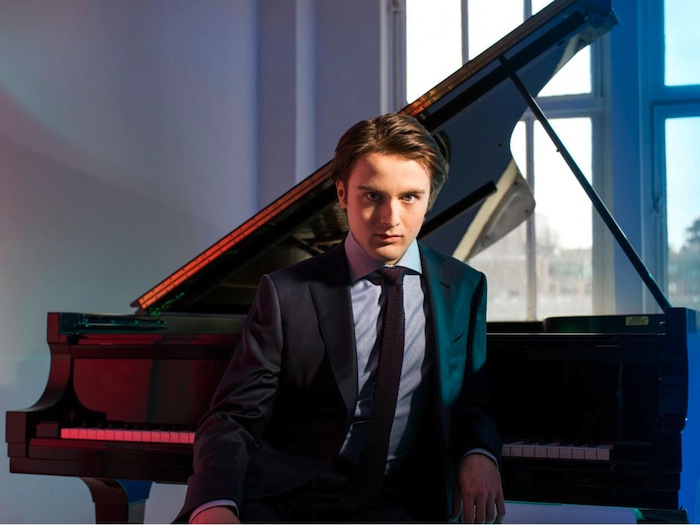Trifonov is extraordinary in his survey of 20th Century piano

Daniil Trifonov closed out his Carnegie Hall Perspectives series Friday night.
Daniil Trifonov’s Carnegie Hall Perspectives Series came to an end a little after 10 p.m. Friday night, as the last of several ovations finally died down. It has been quite a season for him and for the audiences that have been able to hear the range and depth of artistry of this still-young pianist (he turned 27 in March), and it was fittingly capped by a concert that will live in memory as a high point in a lifetime’s concert-going experience.
The concert was “Decades,” Trifonov picking one work from each of the decades of the 20th Century, and playing them in chronological order, although the presentation came up a little short, as Thomas Adès’ Traced Overhead, originally planned to represent the 1990s, was cut, leaving John Corigliano’s 1985 Fantasia on an Ostinato as the conclusion.
Starting from Alban Berg’s Piano Sonata, Op. 1, and then running through Prokofiev, Bartók, Copland, Messiaen, Ligeti, Stockhausen, John Adams, then Corigliano, the program notes acknowledged this as a “highly selective” survey. One can, and should, argue with Trifonov’s story of how piano music and composition changed in the 20th Century, as the period is too complex for any one view to fairly apprehend. In a drastic break from the past classical tradition, evolution was replaced by revolution, and new movements didn’t always eliminate old ones.
Trifonov touched on the vanguards but, despite what the program notes claimed, left out the avant-garde — there was Berg’s late romanticism but not Schoenberg’s systematized atonality, Ligeti’s early Musica ricercata but not his Etudes, no Cage, no Feldman, not even avant-garde forefathers Satie or Debussy.
But one could not argue with Trifonov’s artistry or pianism. One anticipated some revelations in hearing him play repertory that had up to this point been unfamiliar in his career, but this extraordinary performance obliterated all expectations.
The great jazz critic Francis Davis has described two kinds of virtuosity, one in which the music is played as well as can be imagined, the other in which the playing is beyond anything one could have imagined. Trifonov’s virtuosity was the latter. The pianist belongs in the same company as Alfred Cortot, Glenn Gould, Sviatoslav Richter and Cecil Taylor. This is not to compare him to any other musician — like those, he must be heard on his own terms. As this concert displayed, those terms include a breathtaking dynamic range, unmatched technical proficiency and power, an inherent feeling for narrative drama, and a willingness to court danger.
Trifonov played the music without interruption — a program rule asked the audience to hold their applause, and they did — in each half. With this, there was not only a story of one musical step leading to the next, but decades talking with each other, back and forth through time. And so after the emotionalism of Berg’s Sonata, Prokofiev’s Sarcasms sounded bitter, even mocking, the austere foundation of Corigliano’s Fantasia was a direct offspring of Ligeti, and Messiaen and Stockhausen turned out to be the two sides of the same sonic and spiritual coin.
What was most unexpected about the concert, and what turned out to be the greatest revelation of all, is what one learned about the core of Trifonov’s artistry. When he plays Schumann or Chopin, one expects the rich expression as it’s inherent in the music. But when he explores the granitic surface of Copland’s Piano Variations, finds meaning in each dip and notch, and pulls a palpable sense of mystery out of a work known previously for its rigorous logic, one sees the astonishing depth of his intellectual, aesthetic and expressive powers.
Underneath all this was Trifonov’s inexhaustable concentration and energy. The ringing force of the opening notes of the Sostenuto from Musica ricercata matched in inverse proportion the focused delicacy that started the Berg. As in the first half, one was immediately and unwaveringly engulfed in the pianist’s world.
Along with the experience of hearing everything in entirely new ways was the feeling that one was hearing everything for the first time — even more, that one was hearing for the very first time how the music was supposed to be. The Berg Sonata wasn’t just romantic but dramatic in an operatic sense; Trifonov built the piece from his dry, spun-glass opening to critical moments where the music burst into song. He played with an unparalleled understanding of the composition’s structure.
Sarcasms and Bartók’s Out of Doors were spooky, threatening, played not only with an extremity of expression that went beyond any previous experience but with a psychological mania in the former and a chthonic immersion in the latter that were dangerous, as if Trifonov’s Dr. Jeckyll was on the cusp of becoming Mr. Hyde.
“Le baiser de l’Enfant-Jésus” from Messiaen’s Vingt Regards sur l’Enfant-Jésus was both the warmest, gentlest, most luminous lullaby and the most ecstatic religious vision. Playing Klavierstück IX, he let Stockhausen’s modernism speak for itself and brought forth the composer’s intense spirituality, something never heard in performances of his music from the 1950s and early ’60s.
While one initially regretted the loss of Traced Overhead the gentleness with which Trifonov finished Corigliano’s Fantasia on an Ostinato rounded off the concert in the same way his playing of Messiaen had closed the first half. The improvisation in the Fantasia was astonishingly seamless and effortless.
Trifonov approached the Corigliano piece through John Adams’ China Gates, which he played by simply illuminating its beautiful sound. With this musician, that meant something far beyond the most gorgeous Medieval manuscript one has ever seen.







Posted May 06, 2018 at 12:53 am by ELENA NOGINA
The review itself is a piece of art!
Posted Jul 21, 2019 at 4:52 am by Lina
BRAVISSIMO, dear Daniil. From Lithaunia.